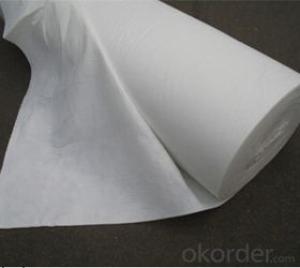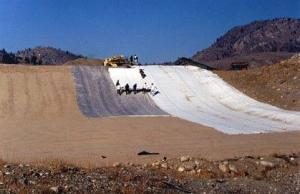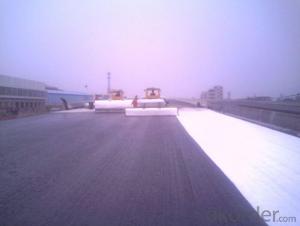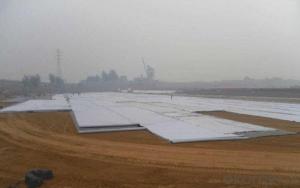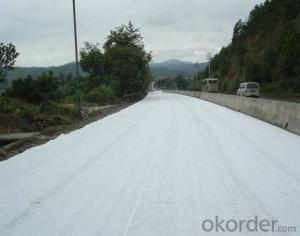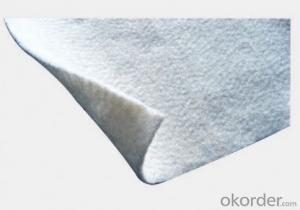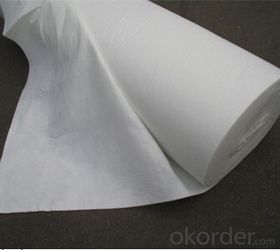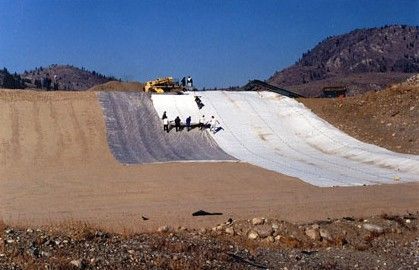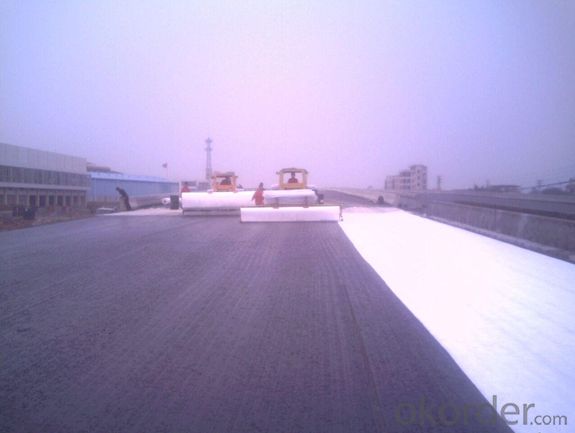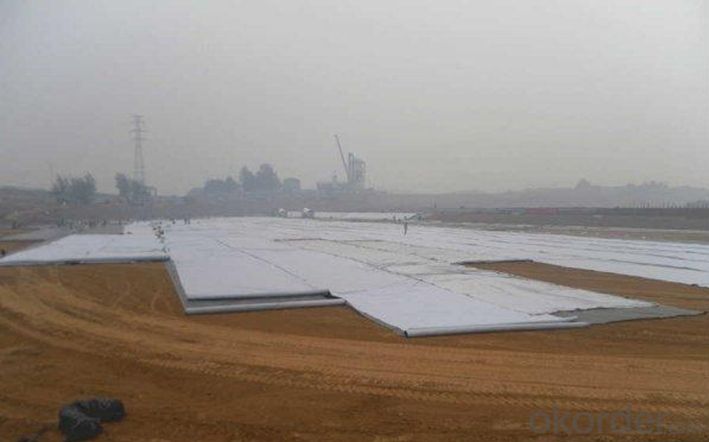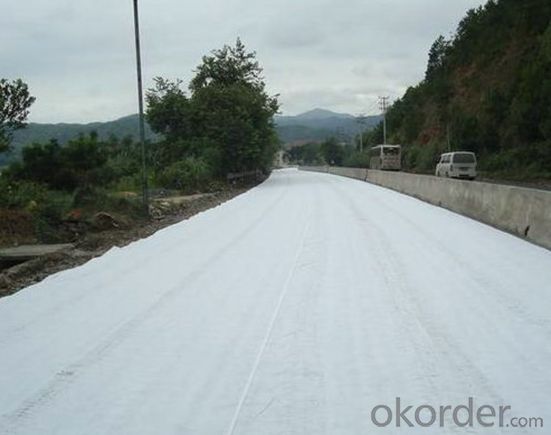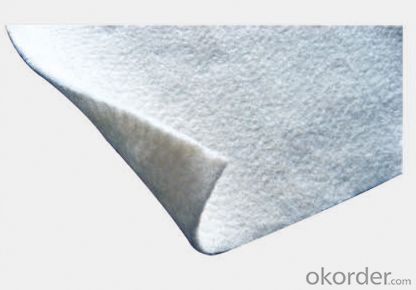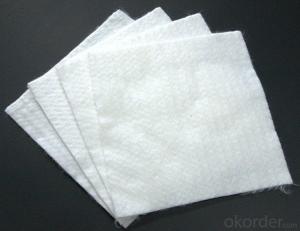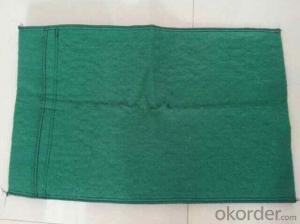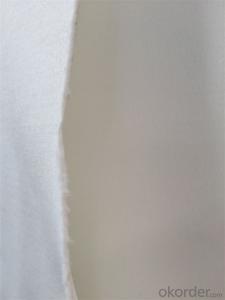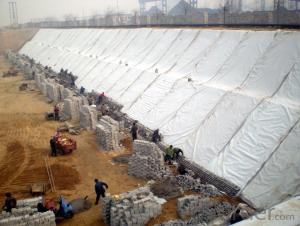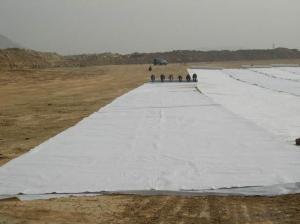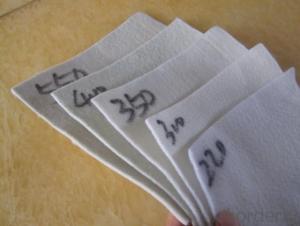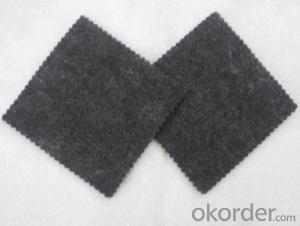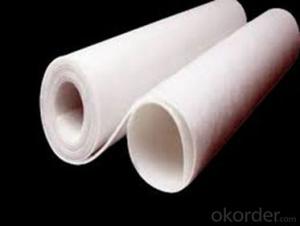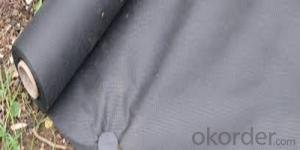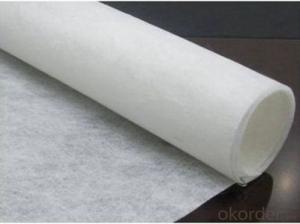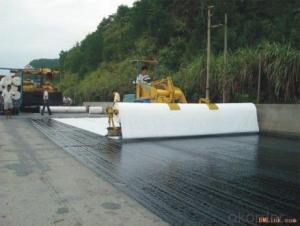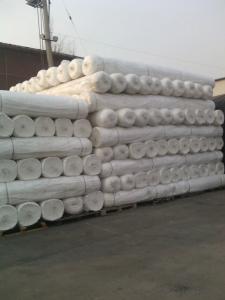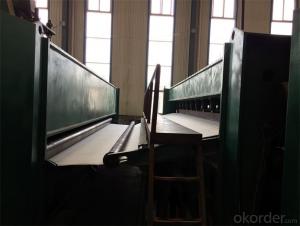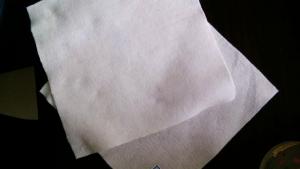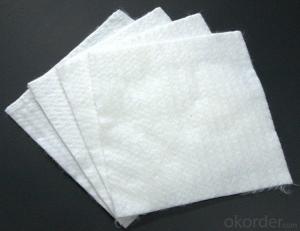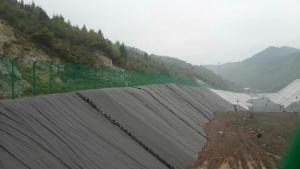Geotextil Que Es para Construcción de Carreteras - Tela No Tejida Geotextil
- Loading Port:
- Qingdao
- Payment Terms:
- TT OR LC
- Min Order Qty:
- 20000 m²
- Supply Capability:
- 1500000 m²/month
OKorder Service Pledge
OKorder Financial Service
You Might Also Like
Functions of Non-woven Geotextile for Road Construction:
1.Separation
The isolation of the railway dregs and the roadbed, roadbed and the soft base, surface of the airdrome and parking lot and the groundsill, different dam materials. It isolates the soil and the gravel of two kinds different.granule pathway from the groundsill or other buildings.
2.Reinforcement
The highway, railway, soil-stone dam, breakwater, airport, backfill soil of retaining wall, slope protection, etc in which distributes the earth stress, prevents the side-displacement of the earth body and improves the earthbody stability.
3.Protection
It prevents the bank from being washed out, protects the bank and the bottom, prevents the water and soil from being washed away
Technical Data Sheet of Short Fiber Nonwoven Geotextile for Road Construction:
Item | Art No. | 1 | 2 | 3 | 4 | 5 | 6 | 7 | 8 | 9 | 10 | 11 |
Unit weight, g/m2 | 100 | 150 | 200 | 250 | 300 | 350 | 400 | 450 | 500 | 600 | 800 | |
Weight tolerance, % | -8 | -8 | -8 | -8 | -7 | -7 | -7 | -7 | -6 | -6 | -6 | |
Thickness, ≥mm | 0.9 | 1.3 | 1.7 | 2.1 | 2.4 | 2.7 | 3.0 | 3.3 | 3.6 | 4.1 | 5.0 | |
Break strength, ≥kN/m | 2.5 | 4.5 | 6.5 | 8.0 | 9.5 | 11.0 | 12.5 | 14.0 | 16.0 | 19.0 | 25.0 | |
CBR burst strength, ≥kN | 0.3 | 0.6 | 0.9 | 1.2 | 1.5 | 1.8 | 2.1 | 2.4 | 2.7 | 3.2 | 4.0 | |
Tear strength, ≥kN | 0.08 | 0.12 | 0.16 | 0.20 | 0.24 | 0.28 | 0.33 | 0.38 | 0.42 | 0.46 | 0.60 | |
Width tolerance, % | -0.5 | |||||||||||
Break elongation, % | 25-100 | |||||||||||
EOS O90, mm | 0.07-0.2 | |||||||||||
Vertical permeability coefficient, cm/s | K×(10-1-10-3)K=1.0-9.9 | |||||||||||
RFQ:
What is the main application of Short Fiber Nonwoven Geotextile?
The main application of our Short Fiber Nonwoven Geotextile is as follows: The highway, railway, soil-stone dam, breakwater, airport, backfill soil of retaining wall, slope protection, etc.
Where is your main market?
Our main market is in Middle East, South America and some African countries.
What is your advantages for the Short Fiber Nonwoven Geotextile?
One of the largest manufacturer of Short Fiber Nonwoven Geotextile with advanced equipment, big production capacity and excellent quality.
- Q: How do geotextiles help with reinforcement of geogrid retaining walls?
- Geotextiles help with the reinforcement of geogrid retaining walls by acting as a separator between the backfill materials and the geogrids. They prevent the fine particles in the backfill from clogging the geogrids, maintaining their effective functioning. Additionally, geotextiles distribute the load evenly across the geogrids, enhancing their strength and stability.
- Q: What are the specifications for geotextiles in roadways?
- Geotextiles used in roadways should meet certain specifications to ensure their effectiveness. These specifications typically include factors such as tensile strength, puncture resistance, filtration capability, and elongation properties. Additionally, the geotextiles should have appropriate thickness, weight, and permeability to allow for proper drainage and filtration of water. The specifications may vary based on the specific requirements of the road project, but overall, geotextiles in roadways need to be durable, efficient, and capable of enhancing the overall performance and longevity of the road.
- Q: Can geotextiles be used in geocomposite drains?
- Yes, geotextiles can be used in geocomposite drains. Geocomposite drains typically consist of a geotextile fabric wrapped around a core material, such as a perforated pipe. The geotextile helps to filter and separate fine particles from the core material, preventing clogging and enhancing drainage efficiency.
- Q: Where is the geotextile in the municipal works?
- Conservation, consideration, there is more green and more Chinese geotextile material manufacturers
- Q: What is the difference between polypropylene geotextile, polypropylene geotextile and polyester geotextile
- Material is not the same
- Q: How do geotextiles help with filtration in wastewater treatment systems?
- Geotextiles serve as a crucial component in wastewater treatment systems by providing effective filtration. These specialized fabrics have excellent permeability, allowing water to pass through while retaining solid particles and contaminants. Geotextiles act as a physical barrier, preventing the clogging of drainage systems and ensuring efficient flow of water through the treatment process. They also assist in the separation and retention of suspended solids, which aids in the removal of pollutants, sediments, and organic matter from wastewater. Overall, geotextiles enhance the filtration capacity of wastewater treatment systems, leading to improved water quality and environmental sustainability.
- Q: 250 grams of two cloth a film 0.8 thick geotextile what price
- 250 grams of two cloth a film 0.8 thick geotextile per square meter between about 10 yuan -13 yuan, the current price is the lowest in recent years.
- Q: What are the different geotextile specifications and standards?
- There are various geotextile specifications and standards that are used to ensure the quality and performance of geotextile materials. Some of the commonly recognized specifications and standards include ASTM D6389, ASTM D4533, and ISO 10318. These standards outline the testing methods, physical properties, and performance requirements for geotextiles in various applications. Additionally, different countries and regions may have their own specific specifications and standards that are followed for geotextile products. Overall, these specifications and standards help to ensure the consistency and reliability of geotextile materials in engineering and construction projects.
- Q: What are the design considerations for geotextile-reinforced slopes?
- Some design considerations for geotextile-reinforced slopes include the slope stability analysis, soil properties and characteristics, selection of appropriate geotextile material and specifications, design of the reinforcement layout and spacing, evaluation of potential effects of water flow and drainage, and consideration of long-term performance and maintenance requirements.
- Q: Geotextile with glue can stick cement wall
- With the wind oil fine soaked, wipe with a rag off.
Send your message to us
Geotextil Que Es para Construcción de Carreteras - Tela No Tejida Geotextil
- Loading Port:
- Qingdao
- Payment Terms:
- TT OR LC
- Min Order Qty:
- 20000 m²
- Supply Capability:
- 1500000 m²/month
OKorder Service Pledge
OKorder Financial Service
Similar products
Hot products
Hot Searches
Related keywords
